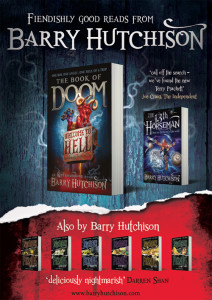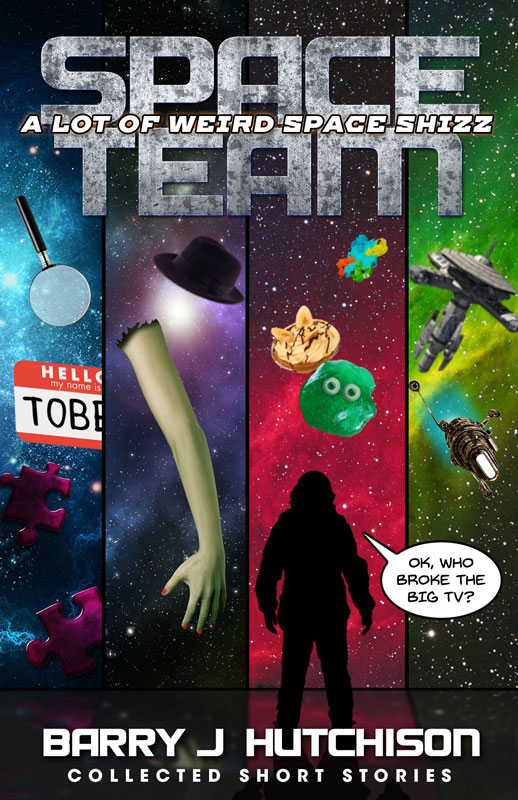As I’ve mentioned elsewhere on the site, I’m currently a full-time traditionally-published children’s author. In case you’re not clear what I mean by ‘traditionally-published’, I mean I write my books, I send them to one or more publishers, then the publisher pays me an advance and handles the book’s production.
If all goes according to plan, the book then sells enough copies for me to eventually earn royalty payments (after the advance has been recouped by the publisher), and hopefully sells to foreign territories, too. I’ve been working like this for about seven or eight years now, since before my first book was published in 2010.

Some of my traditionally-published books
During that time, I’ve been intrigued by the growth in self-publishing. A few years ago, self-publishing was viewed by many as a means of writers not good enough to get a traditional publishing deal to get their work out into the world. In reality, there was a lot of great stuff being self-published, but the general opinion was that if you had to self-pub your work, your writing probably wasn’t good enough to make it as a ‘proper’ book.
Nowadays, that’s all changed, and it’s mostly thanks to Amazon. Love it or hate it (and a lot of writers, publishers and booksellers loathe it), Amazon has forever altered the publishing landscape, removing many of the barriers to getting a book out into the world.
On one hand, that’s great news! By making it easy for anyone to publish a book, it has allowed some really interesting titles to get out there which may not have found a home at a traditional publisher. It’s also helped reinvigorate the short story market, something traditional publishing was reluctant to touch.
“And yet, despite the ever-growing mountain of shit that clogs up much of the Kindle store, an increasing number of traditionally-published authors have started to dip their toes into ebook self-publishing.”
On the other hand, a lot of those millions upon millions of new titles being released are bad. Really bad. With no gatekeepers to perform quality control there’s an awful lot of truly fucking awful material being spewed out into the world, littered not just with flimsy plots and dull characters, but with basic spelling and punctuation errors running roughshod across every virtual page.
And yet, despite the ever-growing mountain of shit that clogs up much of the Kindle store, an increasing number of traditionally-published authors have started to dip their toes into ebook self-publishing, and after a lot of thought I’ve decided to join them. I’m going to keep publishing my children’s books via traditional publishers (hopefully!), but am going to try self-publishing my adult books.
Here are some of the pros and cons I weighed up to help me reach my decision…
Self-Publishing Cons
- You have to do everything yourself
- It’s expensive to do print runs
- Its still looked-down on by many people
Self-Publishing Pros
- You have the freedom to do everything just how you want to
- You get to keep all the lovely money
- Can go from finished book to being on sale in 24 hours
The Pros are all pretty self-explanatory, but let’s look at those Cons in a little more detail.
You Have to Do Everything Yourself
This is a biggie. Most authors I know write books because they love telling stories. They don’t necessarily like designing covers, creating marketing plans or doing fiddly manuscript formatting stuff.
Increasingly in traditional publishing, though, authors are already expected to do a lot more than write stories. Gone are the days of publishers having anything resembling a marketing budget for their books. While I’ve been quite lucky over the years with posters, banners, bookmarks and other marketing materials, I’ve known authors have books come out and their publisher hasn’t even acknowledged the publication date on social media.
Nowadays, authors are expected to handle at least 90% of the marketing of their books, but are rarely given the tools to help them do so. They don’t have access to the publisher’s media contacts, they have no ability to alter the price of their books, or even to get an accurate view of how well the book is selling, which would at least give some indication of how effective their marketing efforts are.
Publishers do still provide a range of services including editing, proofreading, cover design and the like, but these services are increasingly available elsewhere (for a fee), while some, like cover design, can be done by the author themselves – with varying degrees of success.
It’s Expensive to do Print Runs
It can be expensive to get lots of copies of a book printed, particularly when there’s virtually no chance of getting shops to stock any… but so what? The ebook market is massive, so the enthusiastic self-publisher could potentially make their name and fortune via digital distribution alone.
For those desperate to see their book in print (and let’s face it, who doesn’t love an actual proper book?) then there are a range of print on demand options available, including Amazon’s own CreateSpace. With no outlay whatsoever beyond the time it takes to format a Word document correctly, authors can have their book available to purchase in print via Amazon. Once a reader clicks the Buy button, the book is printed and sent-off, with the author receiving a royalty. No need for costly print runs, or to clog up your garage with thousands of unsold copies.
It’s Still Looked Down on by Many People
Who cares?
So those are the Cons and, like I say, the Pros pretty much take care of themselves, but I’m going to add one more Pro to the list which I think is probably the most important one for me, and one I think a lot of self-published authors will relate to.
The Book’s Success or Failure is Down to Me Alone
Yes, that statement is pretty scary, but it’s also quite liberating. I’ve often seen authors – myself included – bemoan the fact that their book would have done better if the publisher had done X or Y. It was marketed wrong (or, more likely, not at all). It was pitched at the wrong audience, or the cover wasn’t strong enough, or those changes to the second half the editor insisted on diluted the impact of the story.
The fact of it is, sometimes books just don’t sell, regardless of the effort put into shifting copies. The best-written, best-edited, best-marketed book in the world might flop. There’s no-one to blame, it just happens. And yet, most authors I know – again, myself included – usually can’t help but feel that someone in the publisher could have done something differently, and we sensitive creative types can be left feeling our precious babies have been neglected by those whose care we placed them in.
With self-publishing, though, there’s no-one else to shift the blame onto. If a book doesn’t sell, it’s nobody’s fault but the author’s. They are in sole charge of a book’s success, and the only person to blame for its failure. I find that quite exciting. Terrifying, yes, but mostly exciting.
So all that, in a nutshell, is what has convinced me to try to self-publish my adult books. I’ll go into it all in more detail – as well as go through some of the other arguments for and against the decision – in a later post. For now, though, I’d love to hear your thoughts on all this, so please leave a comment below.


I think self publishing in your case is a great idea. While you mentioned it briefly at the beginning, I think one of the cons that you’re missing is how hard it is to get noticed as a jewel amongst the mountain of turds. But since you already have some name recognition, that should be (slightly) mitigated. I enjoy the crime writer Lawrence Block, and self publishing seems to be treating him pretty well, so I’d say the “looked down upon” aspect can be easily ignored for sure, since he’s a legend. I’ll read anything you write, in whatever format, and look forward to your adult work, however it comes into the world.
You’re absolutely right, John, standing out from the pile is probably the biggest challenge in self-publishing, but I think the same could be said for traditional publishing. In fact, I think it’s often the same pile you’re trying to stand out in, as the majority of people don’t see self-published and traditionally published ebooks as different things. They’re just all ebooks to most people, some more expensive and with more recognisable names on the cover than others.
Just as an added pro, you can be available everywhere the ebook publisher is available. Which means I don’t have to wait for traditional publishers to take a chance on you overseas. Their loss and my very selfish gain!
Yes, good point, Bran – instant worldwide availability is a big plus!
Great post, Barry and good luck with it. I self publish my Tyler Lawless series and they have great reviews and sell, my concern with Create Space is that the published book just diesnt look professional enough. Probably my fault. So any tips about that gladly accepted!
I’m going to take a look into Create Space once I’ve finished the first six part of the Bug and collected it into a single volume. I plan making that available in print… somehow.
Not sure how many people actually look down on self publishing – there’s no sort option on Amazon that I’m aware of to only select self published books and the ones printed on demand by CreateSpace look near enough like any other paperback unless you skim to the back and see it’s printed by Amazon.
Yup. there’s a lot of trash on Kindle but the bookstores don’t only stock top quality titles either. Kindle has just made it easier to publish once you’ve done that small task of writing the book in the first place 🙂
Hey Trevor, thanks for commenting!
In certain circles there’s definitely still a bit of a stigma about self-publishing. I’ve seen it, unfortunately. But it’s nothing like what it was even a couple of years ago, so that’s encouraging.
I think when you compare a ‘good’ indie-published title with a ‘good’ trad-published book, there’s no real different whatsoever in quality of writing, quality of editing, quality of production, or any of that.
However, go to the other end and compare the ‘bad’ stuff and they’re worlds apart. Yes, traditional-publishing puts out ‘bad’ books, but they’re nothing like some of the absolute dross that makes it onto Kindle. I’ve seen Kindle books that are ten pages long, written all in block caps, littered with typos, and utterly incoherent. And there are probably tens of thousands like that, not just the odd one or two. That’s just what happens when all the barriers to publishing are removed, and there’s not a lot we can do about it.
I do think it’ll settle down, though, as the professional stuff keeps rising to the top, and the rushed-out garbage sinks without a trace. Once that happens, I think any remaining stigma about self-publishing will go completely, and it’ll all just be books.
Hi Barry,
I retired about 10 years ago and decided to try writing –settling on young adult and middle grade. Queried agents and finally landed one. Over about five years I wrote ten books but nothing happened. I gave up. This year I dusted them off and self published on Amazon. Five are on so far with the rest to follow. I’m getting too old to fart around and just wanted to have fun giving this a try. It’s a kick trying different strategies — we’ll see what happens. The books are around 20k word count and work nice at the lower price point. Good luck with yours!
Mike